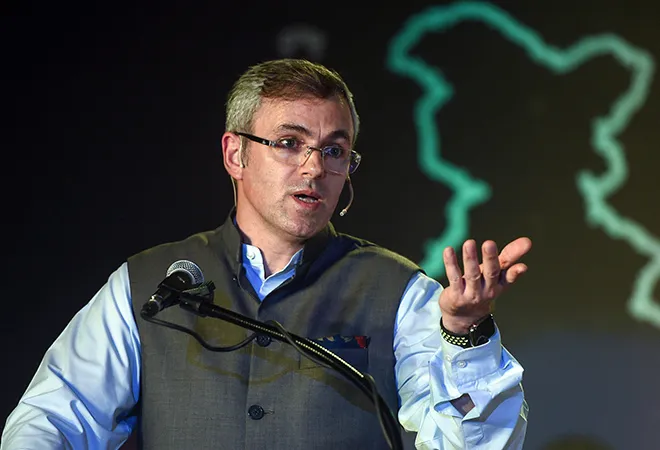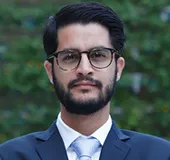
“Bharat Mata Ki Jai… Jai Hind.” Farooq Abdullah thundered at the Vigyan Bhawan in New Delhi during a commemoration ceremony for the late Prime Minister of India, Atal Bihari Vajpayee. Abdullah’s emotional outburst surprised the gathering of who’s who of the BJP and the RSS. Back in Srinagar, he triggered a massive controversy with his passionate sloganeering and was heckled while offering the Eid prayers at the Hazratbal shrine. Nonetheless, he held the ground and didn’t retract the statement. And the political bazaar was abuzz with rumours on whether Abdullah had replaced Mehbooba Mufti as BJP’s option in Jammu and Kashmir.
Few weeks after the controversy, Farooq Abdullah announced the boycott of the Urban Local Body and Panchayat Elections by the National Conference (NC), linking it with the Supreme Court case on Article 35A. And former Chief Minister Mehbooba Mufti’s Peoples Democratic Party (PDP) soon followed suit. The party wanted to project itself as the saviour of the Article 35A and was willing to confront its erstwhile ally, the BJP. Initially, the top leadership of the PDP was reluctant to boycott the elections. However, after a careful assessment of the situation, it decided to follow Abdullah’s boycott call, to avoid a controversy and restore the dented image of the party.
The results of the Urban Local Body polls show that the BJP and the Congress, piggybacking on the boycott of the two main parties of Kashmir valley, made huge inroads in the Kashmir valley. The BJP won 100 wards out of 624 and will directly control six municipal committees of the Kashmir valley. On the other hand, the Congress has secured 157 wards and the independent candidates won 178 wards. Most of the independent candidates were fielded by Sajad Lone’s Peoples’ Conference which has maintained its alliance with the BJP. In fact, after the breakup of the BJP-PDP alliance, the alliance between Sajad Lone and BJP has turned stronger.
Despite the criticism on the credibility of the elections, the PDP and NC cannot ignore one stark truth: through the boycott of elections, they have ceded space to the BJP, its allies and the Congress party. Historically, the Congress party has had a considerable political foothold in the Kashmir, it is the gains made by the BJP and its ally Peoples’ Conference which is more worrying for the PDP and the NC.
For instance, if the Peoples’ Conference manages to secure the mayorship of the Srinagar city, it will be holding the office in the citadel of the National Conference. This takeover will be demoralising for the cadre of both the NC & the PDP. Perhaps, that is why both the parties, despite questioning the credibility and veracity of these polls, have stepped in to stop the Peoples’ Conference from taking the mayorship of Srinagar.
A series of tweets made by Sajad Lone and his mayoral candidate Junaid Mattu suggest that both the NC and the PDP are firefighting the consequences of the election boycott. One tweet by Junaid Mattu read as follows:
Since the assembly election of 1996, both the NC and the PDP have alternatively held the reins of the State of Jammu and Kashmir by allying with one of the two national parties — the BJP and the Congress. For the first time in the last two decades, a third alternative with the full backing of the BJP has emerged — creating an existential threat to the scions of both parties.
Over the years, both parties had developed the art of using the election boycott of Hurriyat Conference as a strategy of winning some important assembly seats. However, this time the table turned on the NC and the PDP and their boycott has been/will be used by other parties to gain power. The ULB elections was a small manifestation of how the boycott will be used to keep the PDP and the NC out of power. The bigger game will unravel in the assembly and parliament polls.
Abdullah’s gamble
Two months before Farooq Abdullah gave the rousing commemoration to Atal Bihari Vajpayee, the CBI had filed a charge sheet against him in the alleged Jammu and Kashmir Cricket Association scam. Whether Abdullah’s passionate sloganeering at the commemoration was meant to appease the BJP leadership is not clear. But, the first round of his gamble has certainly helped the BJP (and its allies) in taking control of the key municipal committees.
Immediately after the polling for ULB was closed, the Governor of the Jammu and Kashmir made statements on dissolving the assembly — a signal for conducting fresh legislative assembly polls. With the case pertaining to Article 35 A lingering and the court proceeding a long drawn affair, Article 35 A will be a festering issue in the assembly and parliament elections.
The PDP leadership may reluctantly have dragged itself in Farooq Abdullah’s gamble but it cannot escape the consequences of this deadly trap. Both parties will have to make a U-turn on Article 35 to contest the upcoming elections which will be seen as a betrayal by the people of Kashmir. The election boycotts will also lead to devastating consequences for the PDP and the NC. One, the boycott will wipe out both the parties from the legislative assembly and the parliament. Two, if the BJP and its allies win a majority in the assembly, the special status of J&K and Article 35A will be endangered. Also, the PDP and the NC will have facilitated the BJP’s “Mission 44” and paved the way for its majority in the J&K assembly. Third, an alternative to the NC and the PDP will emerge which could very well turn into the beginning of the end of both parties.
The views expressed above belong to the author(s). ORF research and analyses now available on Telegram! Click here to access our curated content — blogs, longforms and interviews.




 PREV
PREV


